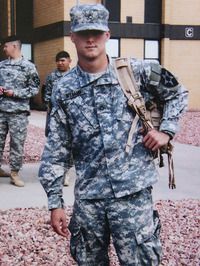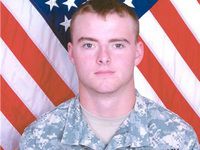 Connie Scott, of Owatonna, Minn., would like the nation to be as proud of her son’s sacrifice for his country as her family is. She knows it’s not, however. Her son, Pfc. Brian Matthew Williams, 20, killed himself and until today, the nation didn’t honor the death of soldiers who served and died by suicide.
Connie Scott, of Owatonna, Minn., would like the nation to be as proud of her son’s sacrifice for his country as her family is. She knows it’s not, however. Her son, Pfc. Brian Matthew Williams, 20, killed himself and until today, the nation didn’t honor the death of soldiers who served and died by suicide.
“There’s been a lot of disappointment and anger that we don’t receive the same recognition that those killed in action receive,” she told me this afternoon. “When people find out that a family has lost someone in the military in combat, there’s immediately a response. There are recognitions and honors, awards, parades, medals, reporters, and memorial events. When it’s announced that another soldier ends his life, it’s still uncomfortable.”
President Barack Obama did not make a public announcement in ending the government’s policy of not sending a condolence letter to the families of soldiers who kill themselves. He issued a press release, instead:
“As Commander in Chief, I am deeply grateful for the service of all our men and women in uniform, and grieve for the loss of those who suffer from the wounds of war — seen and unseen. Since taking office, I’ve been committed to removing the stigma associated with the unseen wounds of war, which is why I’ve worked to expand our mental health budgets, and ensure that all our men and women in uniform receive the care they need.
“As a next step and in consultation with the Secretary of Defense and the military chain of command, I have also decided to reverse a long-standing policy of not sending condolence letters to the families of service members who commit suicide while deployed to a combat zone. This decision was made after a difficult and exhaustive review of the former policy, and I did not make it lightly.
“This issue is emotional, painful, and complicated, but these Americans served our nation bravely. They didn’t die because they were weak. And the fact that they didn’t get the help they needed must change. Our men and women in uniform have borne the incredible burden of our wars, and we need to do everything in our power to honor their service, and to help them stay strong for themselves, for their families and for our nation.”
Brian Williams was stationed at a combat outpost in Ramadi, Iraq when he was sent home on leave for the Christmas holiday in 2007. His unit had lost several men and his fiancee wrote him that she loved someone else.
“He didn’t talk to me about it,” his mother said. “He talked to his siblings and told them a couple of stories. His grandmother asked him how it was and he said it was worse than anything you can imagine.”
 His job in Iraq was maintaining electronic gear, but he often went out on patrol with his unit. “He was led to believe that he would be keeping the equipment in working order. But he was also part of doing the night patrols where they would go into Ramadi and kick in doors, looking for insurgents,” Scott told NPR in a 2010 story.
His job in Iraq was maintaining electronic gear, but he often went out on patrol with his unit. “He was led to believe that he would be keeping the equipment in working order. But he was also part of doing the night patrols where they would go into Ramadi and kick in doors, looking for insurgents,” Scott told NPR in a 2010 story.
The day before he was to return to Iraq, Williams took his own life.
“Suicide is rarely about just one issue, and Brian was dealing with several difficult situations in addition to combat,” Connie Scott wrote on the Suicide Prevention Action Network USA website. “His eyes were glassy, his completion was gray, and he was restless and unable to eat or sleep. But on the last day of his leave things seemed to change. He talked with all of his friends and family, shared his plans for the future, and he seemed OK, in fact better than ever. We didn’t know then what that meant.”
Scott, who served on the Department of Defense task force on soldier suicide, does not expect to receive a letter from President Obama and isn’t sure whether it would make a difference now if she did. “For surviving families, it’s the constant up-and-down that never ends,” she said. “How I feel about it today may not be how I feel about it tomorrow.” She believes, however, that a presidential condolence letter will bring some comfort to many families.
“What makes a person a hero is the day they sign up, the day they enlist,” she said. “Because at that point, they are giving themselves to the government to be used in whatever way the government chooses.”
